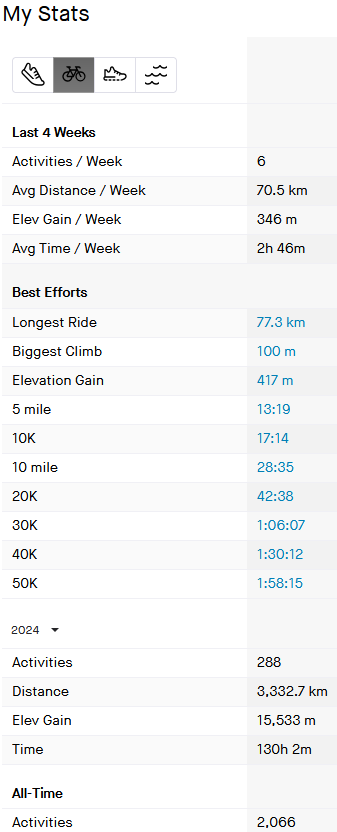- cross-posted to:
- fuckcars@lemmy.world
- cross-posted to:
- fuckcars@lemmy.world
cross-posted from: https://slrpnk.net/post/13929272
So, what’s the take away here ? make it so expensive to live people choose cycling and we get better cities ?
cross-posted from: https://slrpnk.net/post/13929272
So, what’s the take away here ? make it so expensive to live people choose cycling and we get better cities ?
Isn’t Australia still a country where bikes are sold as sporting goods alongside cricket bats and gym mats, rather than as practical devices one would use in everyday life?
Because they’re not practical devices one can use in everyday life here? If you can’t safely travel with it, it’s not a practical means of transport.
I disagree. I ride 10-12km to work and 10-12 km home practically daily. Because I understand people lie on the Internet all the time, here are my Strava cycling stats to show I’m telling the truth:

I cycled daily when I lived in Queensland. I cycled less often (because I’m a wuss about riding in the rain) but still regularly when I lived in Melbourne. And I cycle almost every day in Perth. The last four weeks actually really low for me - between the wet weather and having a holiday in September, my numbers are down. It would usually be 10 rides per week.
To answer @AllNewTypeFace@leminal.space’s question: You can often buy bikes next to the sporting equipment in some stores (cycling is a sport, after all). These are terrible though, and people who really use their bikes get them at dedicated bike stores - which are very common in Australia.
I don’t know about the rest of Australia, but that’s not really the case in Adelaide. There is a pretty strong cycling culture here and a lot of proper bike stores for commuters, road cyclists and mountain bikers. Hosting the Tour Down Under for 25 years has really helped with that. But for whatever reason the government has never really invested in infrastructure that would help.daily commuters.